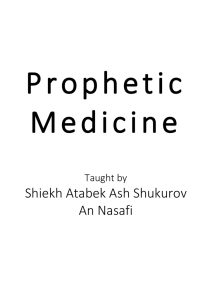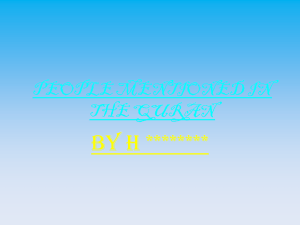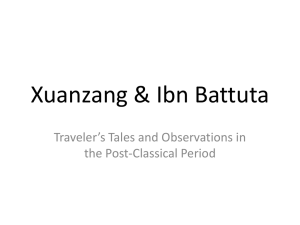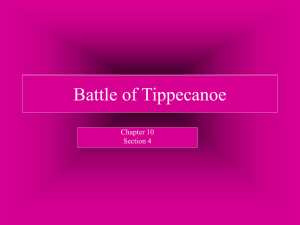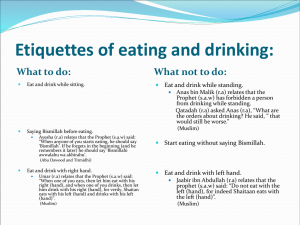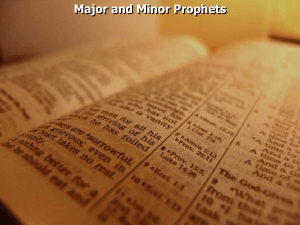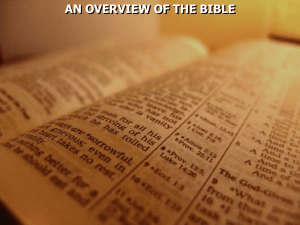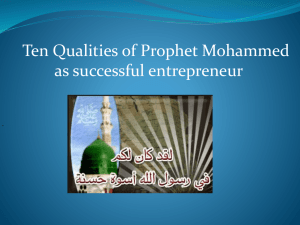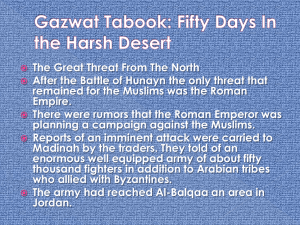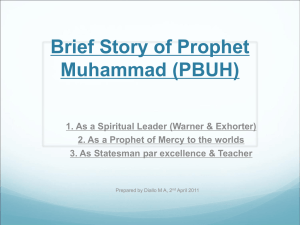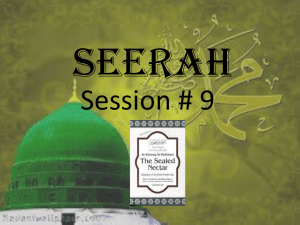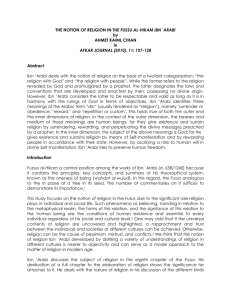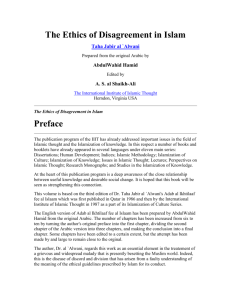Prophetic Medicine – Lesson 1 – Slides
advertisement
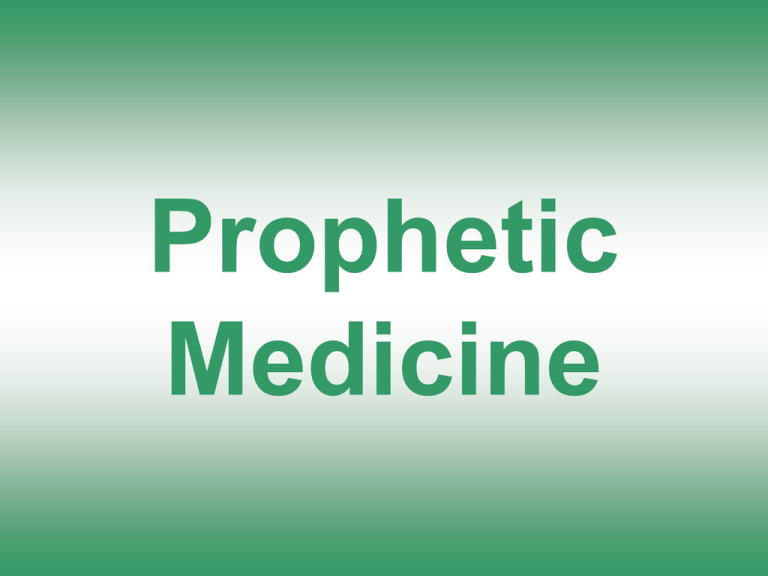
Prophetic Medicine The Prophet’s Knowledge of medicine Our Mother Aisha gained knowledge of herbal medicine through The Prophet and and also through visitors who came to visit There were visitors who were versed in Greek medicine (Unânî),Christian and Jewish medicine some of their expertise having been passed down by The Prophet Solomon. However, the prophet himself gained his knowledge of Medicine directly through the Quran The first instance of Medicine The Prophets Once Prophet Solomon was worshipping in his monastery and the plants and trees suddenly began to speak, explaining their purposes and their uses for man. The plants also expounded on their medicinal properties that cure man and his ailments and also the processes to extract these cures. The Prophet Solomon recorded their descriptions in this miraculous event. ~Related from the Hadith scholars At Tabarânî, Ibn Hibbân and Al Hâkim Does prophetic medicine exist today? Remnants of The Prophet’s Medicine and the inheritance of foreign Medicine Although there are narrations of the actual medicinal practices and uses of the Prophet Muhammad himself, due to a various factors there were not any scholars of highest calibre to deduce rules of medicine that could apply to the countless illnesses, from them. i.e. in Fiqh (Laws of Worship) The scholars took hundreds of Quranic and hadeeth principles and applied them to thousands of methods and cases (masâ’il) As a result hadîth pertaining to Medicine existed but few valuable commentaries were created causing the science to be lost. Thereafter the Muslims inherited Greek, Jewish and Christian methodologies of medicine So the answer unfortunately to the question is No Development of Medicine The Muslims inherited and developed Unânî Medicine (Greek Medicine). We also acquired knowledge of medicine through The Family of the Prophet (Ahl Al Bayt) and the Shia but there is no conclusive proof that their medicine is directly from the Prophet. Greek Medicine was translated towards the latter stages of the Umayyad (Umawi) Caliphate to the early stages of the Abbasid Caliphates (Abbasi Khalîfa) There are many great Muslim scholars who were scholars of Greek Medicine but not prophetic medicine i.e. Farâbi, Bayrûni, Ibn Sîna Initial Material on Prophetic Medicine (Tibb An Nabawi) At Tibb An Nabawi – The first Book on this subject published on this subject. By Ali Ar Riddâh (a descent of the Prophet), 11th Imam of the Shi’a. Died 203 After Hijra (AH) (818 CE). A small book quoting hadîth on Prophetic medicine but without explanations. translated in French, latin and Arabic. Tibb An Nabawi, Abd Al Malik bin Habeeb (Hubayb), d 238AH (853 CE) A Arabian Qurayshi Born in Andalusia, Spain Tibb An Nabawi, Al Hâfiż Ibn As Sinni (Abu Bakr Adaynûri) d 365AH Tibb An Nabawi, Abû Nu’aym al Aspahânî,. d 430AH. (818 CE). Author of the famous Hilyatul Awliyâh, In the same age as Ibn Explanations and Commentaries on Prophetic Medicine Initially most of those scholars that mentioned Prophet Medicine were muhadithûn (Scholars of Prophetic Narrations) thus have looked at the hadîth through a legal perspective, essentially not commenting on the narrations The first explanation came from the philosopher, herbalist (hakîm) and linguist, Abdul Latîf al Bagdâdî, d 629AH (1231 CE) (closer to the time of the great Polymath Ibn al Jawzî) 200 years after Ibn Sîna passed away The Famous notables of Islamic Medicine Smallpox and measles, L. Rhazes/Muhammad Ibn Zakarîya al Razi – died 240AH (925 CE) The Canon of Medicine (Al Qânûn) by Avicenna/Abu Ali Al Husayn Ibn Sîna. d 428AH (1037 CE). Provally the most famous Simplification of Therapeutics and diet by Avenzoar/Abd Al Mâlik Ibn Zuhr. d 557AH (1162 CE) Generalities in Medicine by Averroes/A.M Ibn Rushd d 595AH (1198 CE) A commentary on the analysis of the cannon of Avicenna, by Alî b n al Nafîs. d 607AH (1288 CE) note: the name after the ‘/’ indicates the given name of the author Notables Islamic Scholars of the middle era At Tibb An Nabawi by ibn Qayyim al Jawziyah – d 751AH(1350 CE) Probably the most famous at present on this subject At Tibb An Nabawi of Imam Dhahabî, d 748 AH (1274 CE). Ordered/stratified his work emulating the work of Avicenna called Al Qanûn, so very comprehensive, teacher of the Polymath, Al Jawzi At Tibb An Nabawi, Imam Suyûti d 911 AH (1505 CE)– Another famous work. He also quotes from Ibn Al Nafîs and Avicenna Types of medicine There are two types of medicine at present; Allopathic – Linguistically meaning ‘different than the disease’ This is to treat a illness with it’s opposite or that which is different (especially concerning modern conventional medicine which is allopathic) Homeopathic - To treat a disease with it’s likeness. That the treatments must be able to produce symptoms that are similar to those of the disease being treated What type of medicine did The Prophet use? Prophetic Medicine used practised his own medicine. (from the Qur’ân) However he did demonstrate a mix of medicines An homeopath example of the Prophet’s Medicine The prophet came upon a young boy whom had been suffering from in an inflammation of his throat and a person was attempting to cure this condition through rubbing the uvula (throat) area with a abrasive type of fabric wrapped around the hand He said in amazement; ‘Do not kill your children. When your child suffers from throat inflammation (uhtraa) or headache, use Costus/Indian Aloe (Qist al Ûd) treated in freshwater and make the child sniff it’ This is a example of a hot disease being treated by a hot medicine (here, of the third degree) An Allopath example of the Prophet’s Medicine Towards the end of the life of the Prophet, he was affected with fever and commented thus upon it’s cure; ‘Whosoever is amongst you is struck with fever, which is a slice of hell-fire, let him extinguish it with cold water’ Reported by Rafi’ bin Khadij
